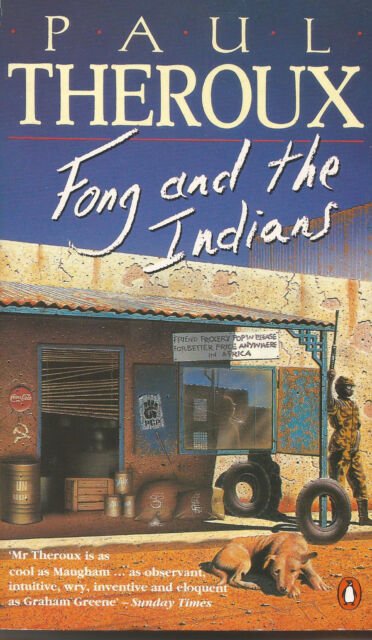Fong and the Indians by Paul Theroux (Penguin)
Paul Theroux is mostly known for his travel essays but he has also written a number of novels. Fong and the Indians is a story he wrote shortly after meeting a glum Chinese gentleman in Kampala, Uganda. When he started the novel, he had been living in East Africa for about four years. At first, what he wrote about the place was “apologetic and sorrowful, or else very angry”. Writing fiction about Africa gave him another perspective. “Africa was, briefly, a comedy”.
Sam Fong, a Chinese immigrant who has been living in East Africa for thirty-five years is the owner of a small grocery store. “They called him an immigrant; actually he had lived in Africa longer than the Prime Minister, who was an African. But to be one Chinaman in a country of seven million Africans is not easy: you stand out; the East cannot save you, you remain a visible immigrant all your born days and so do your children, and so do theirs.”
Sam Fong wasn’t always a grocer. He was a carpenter who worked at the Ministry of Works when East Africa was still a British Protectorate. . He became a grocer out of necessity after the country gained independence. One day an Englishman came and asked Sam Fong to point out “someone terribly keen”. The Englishman insisted on a native, an African.
The following day, the Englishman returned and handed an envelope to the “keen African” worker, Mohinder Singh. The African was sent to England. When he came back six-months later, he was appointed foreman and became Sam Fong’s boss. The African became like his white bosses, calling his countrymen baboons and useless natives and telling Sam Fong that he could sack him anytime. Sam Fong left the Ministry of Works that day and made three resolutions - “Never trust a white”, “never trust a black”, “never be a carpenter”.
On his way home, Sam Fong spotted a sign reading “Store for Hire”. Fong signs a ten year lease with the owner, an Ismaili from India named Hassanali Fakhru. What Fong didn’t realize was that in his contract was a clause that stated, “And I promise to buy all stocks and stores and goods from the above-named Hassanali Fakhru at prices to be agreed upon so help me God.”
Sam Fong just wants to be left in peace but aside from being swindled by Fakhru, he is faced with a couple of hardline communists from his home country, a couple of Americans who only want to be his “frin”, and continues to be used and abused by the actual owner of the shop, namely Fakhru.
As Theroux has spent time in Africa, his satire is quite funny at times but I’m not sure how it will appeal to today’s readers as he describes the native Africans as crooks and being simple-minded. The Asians, mostly of Indian descent, as cunning scoundrels, and the Chinese, well mostly Fong, as simple-minded and clueless.
The book was originally published in 1968 and I don’t know if it’s the sign of the times or not, but I failed to see the humor in Theroux’s description of Fong taking out his frustrations by beating his wife and having her accept it as part of her duty. In the first three chapters alone, Fong beats his wife for such minor offenses as writing a sign for the grocery store where he works.
The story may be a bit dated but it’s still quite enjoyable. Just remember, don’t apply today’s standards for a story that was written in the late sixties about an African nation becoming independent from British colonialism. It is satire and is meant to be fun or perhaps it was a bit of commentary on life in Africa during those times. ~Ernie Hoyt
